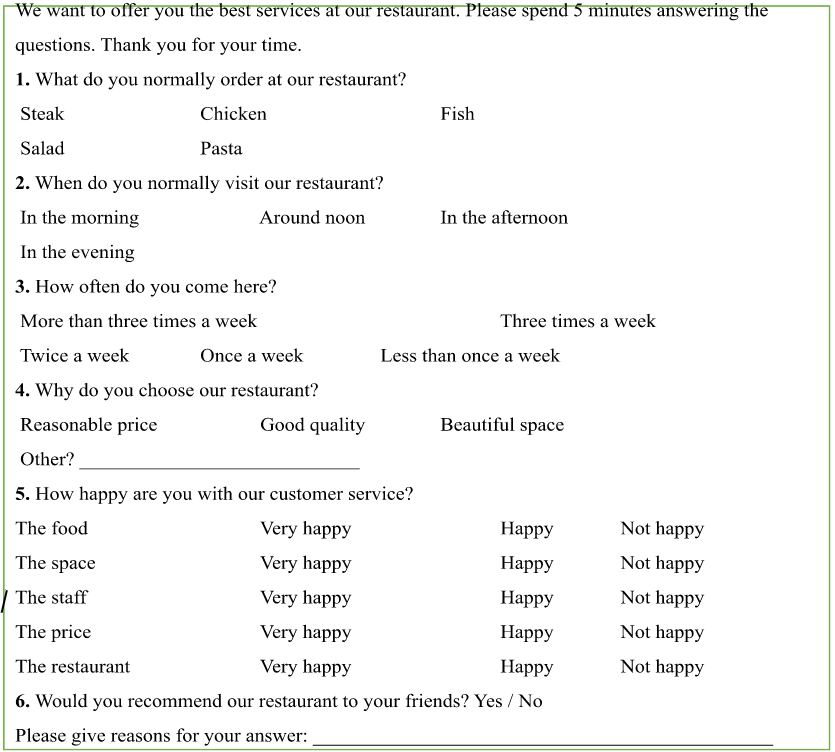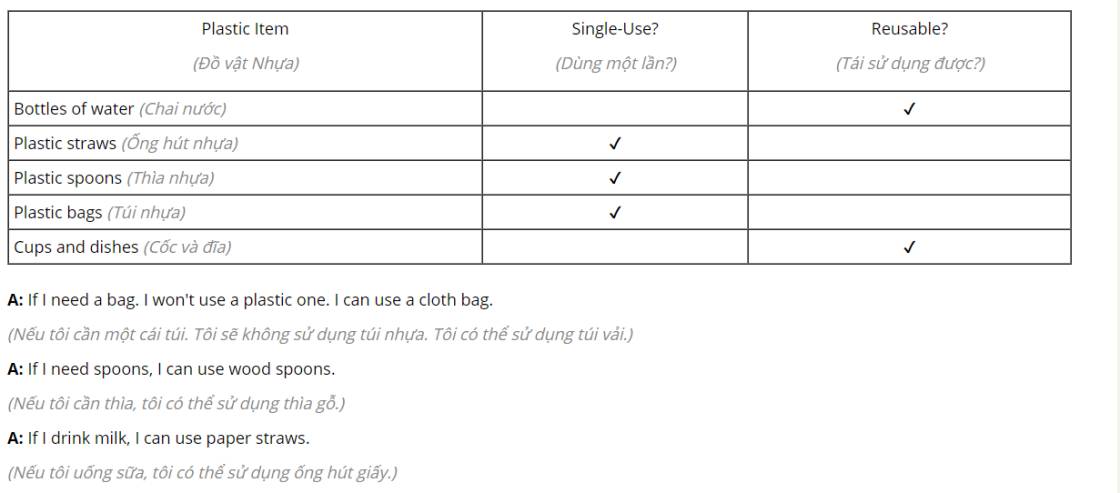Hãy nhập câu hỏi của bạn vào đây, nếu là tài khoản VIP, bạn sẽ được ưu tiên trả lời.

- Set up a facebook page to post information related to the charity.
(Lập trang facebook để đăng thông tin liên quan đến quỹ từ thiện.)
- Set up volunteer teams to save stray dogs and cats.
(Thành lập các đội tình nguyện cứu chó mèo hoang.)
- Share information of the charity and stray animals on social media.
(Chia sẻ thông tin của tổ chức từ thiện và động vật hoang trên mạng xã hội.)

1. We choose to camp in the summer.
(Chúng tôi chọn cắm trại vào mùa hè.)
2. I’m going to take some T-shirts, skirts, shorts, sandals and hats because they are comfortable and cool in summer. I’m going to take a raincoat because it often rains in summer.
(Tôi sẽ mang một vài cái áo phông, váy, quần lửng, dép quai hậu và mũ vì chúng thoải mái và mát mẻ vào mùa hè. Tôi sẽ mang áo mưa vì trời thường mưa vào mùa hè.)

1. We are answering English questions and doing our homework.
(Chúng tôi đang trả lời các câu hỏi tiếng Anh và làm bài tập về nhà.)
2. She is preparing for the discussion.
(Cô ấy đang chuẩn bị cho cuộc thảo luận.)
3. My parents are working in the office. My brother is studying at school.
(Bố mẹ tôi đang làm việc ở văn phòng. Em trai tôi đang học ở trường.)

1. Urban farming adds and preserves green space in cities, providing places for neighbours to come together, strengthen bonds, and build community cohesion. And by increasing vegetation and tree cover, farms and gardens keep city neighbourhoods cooler and fresher, minimizing the health impacts of the heat island effect.
(Nông nghiệp đô thị bổ sung và bảo tồn không gian xanh trong các thành phố, cung cấp nơi để những người hàng xóm xích lại gần nhau, tăng cường mối quan hệ và xây dựng sự gắn kết cộng đồng. Và bằng cách tăng cường thảm thực vật và cây che phủ, các trang trại và khu vườn giữ cho các khu vực dân cư trong thành phố mát mẻ và trong lành hơn, giảm thiểu các tác động đến sức khỏe của hiệu ứng đảo nhiệt.)
2. It can be in a square, a park, a school or a rooftop of a building.
(Nó có thể ở quảng trường, công viên, trường học hoặc sân thượng của một tòa nhà.)
3. The types of plants: vegetables: cabbages, tomatoes, etc., flowers, and succulents
(Các loại cây: rau củ: bắp cải, cà chua, …, hoa và xương rồng)

A: Hello, I’ll be your waiter today. Would you like something to drink?
B: Yes. I’d like a glass of iced tea, please.
A: OK. Are you ready to order, or do you need a few minutes?
B: I think I’m ready. I’ll have the seafood soup to start, and New York steak and salad.
A: How do you want the beef — rare, medium or well done?
B: Well done, please.
A: Would you like a dessert?
B: Yes. I’d like a lemon pie, please.
A: Would you like anything else?
B: No. Thanks.
A: OK. So you’d like a glass of iced tea, seafood soup, New York steak and salad, and a lemon pie. Is that right?
B: Yes.

1.
- What is the sport? (Môn thể thao đó là gì?)
It is jogging. (Nó là môn đi bộ.)
- Where do you do it? (Bạn chơi nó ở đâu?)
I go jogging in the park near my house. (Tôi chạy bộ trong công viên gần nhà.)
- Do you need special equipment? (Bạn có cần thiết bị đặc biệt không?)
No, I don’t. I just need a comfortable pair of shoes. (Không. Tôi chỉ cần một đôi giày thoải mái.)
- Does it cost a lot of money? (Nó có tốn nhiều tiền không?)
No, it doesn’t. (Không hề.)
- Why do you like it? (Tại sao bạn lại thích nó?)
Because it helps me improve my health and makes me relax after hard-working days.
(Vì nó giúp tôi tăng cường sức khỏe và khiến tôi thư thái sau những ngày làm việc mệt mỏi.)
2.
My favorite sport is jogging. I often go jogging with my mom in the park near my house. This sport doesn’t cost a lot of money because I just need a comfortable pair of shoes. Jogging helps me improve my health and makes me relax after hard-working days.

1.
- What do you often do in the evening? (Bạn thường làm gì vào buổi tối?)
- Do you usually play chess? (Bạn có thường chơi cờ vua không?)
- Where do you often go on Sundays? (Bạn thường đi đâu vào chủ nhật?)
- What are you listening to? (Bạn đang nghe gì vậy?)
- Are you making a cake? (Bạn đang làm bánh phải không?)
- Where are you going? (Bạn đang đi đâu vậy?)
2.
A: What do you often do in the evening?
B: I often read books and watch TV.
A: Do you usually play chess?
B: Yes, I do. I play it with my brother every day.
A: Where do you often go on Sundays?
B: I often go to the park with my friends.
A: What are you listening to?
B: I’m listening to some songs.
A: Are you making a cake?
B: No, I’m not. I’m cooking pasta.
A: Where are you going?
B: I’m going to the supermarket to buy some vegetables.



There are many similarities and differences between soccer and tennis. For example, both of these two sports are known and played around the world. In addition, in both kinds of sports, we have certain things we need to play these sports. They are both played with a ball, and both use nets. However, the objective in soccer is to get the ball into the net. But in tennis, you try to hit the tennis ball over the net, inside the lines and try to hit a better shot than your opponents so they can not return the ball. Therefore, you can get the point. Furthermore, in soccer, you can have up to 11 people playing on the field at one time, but in tennis, you can only have up to 2 people on the court. You do not have to wear any kind of protective gear in tennis, but in soccer, you do.